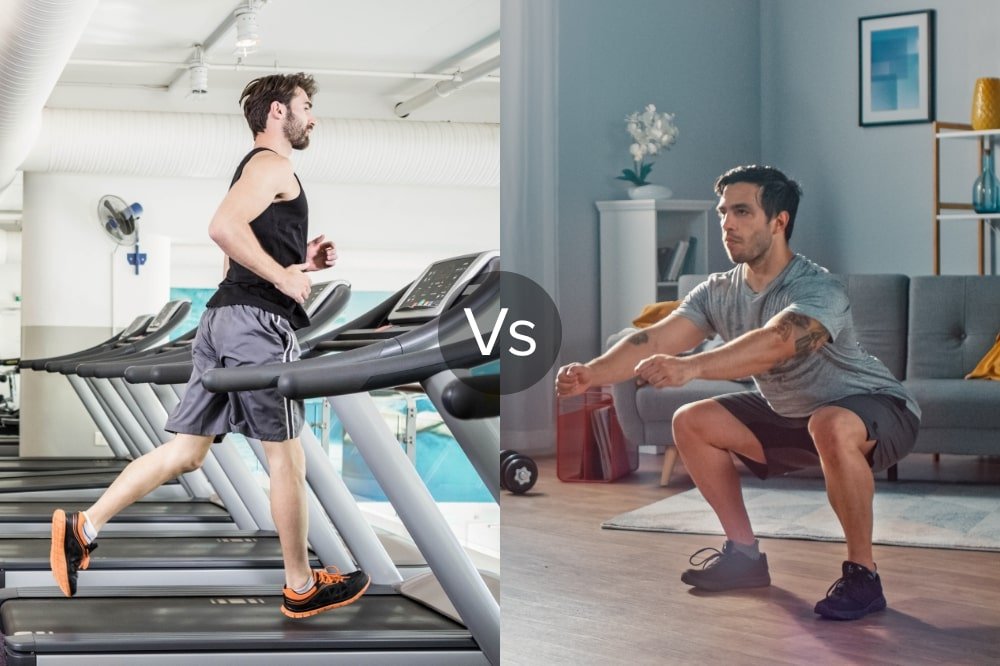Home Workouts vs Gym: Which Is Right for You?
When it comes to maintaining fitness and leading a healthy lifestyle, the decision between working out at home or joining a gym can be a tough one. Both options have their unique benefits and drawbacks, and the choice often depends on individual preferences, goals, and circumstances. In this blog, we’ll explore the pros and cons of home workouts and gym memberships to help you decide which is right for you.
Home Workouts: Convenience at Your Doorstep
Advantages:
- Cost-Effectiveness: One of the most significant advantages of home workouts is the cost savings. There are no monthly membership fees, commuting costs, or expensive gym attire requirements. With a small investment in basic equipment like dumbbells, resistance bands, or a yoga mat, you can create a versatile workout space.
- Flexibility: Home workouts allow you to exercise on your schedule. Whether you’re an early riser or a night owl, you can fit your workout in whenever it’s convenient. This flexibility is especially beneficial for those with busy or unpredictable routines.
- Privacy: Working out at home eliminates the self-consciousness some people feel in a gym setting. You can exercise without worrying about judgment or comparison, which is especially comforting for beginners.
- Time Efficiency: Without the need to commute to a gym, you save time that can be used for longer or more frequent workouts. You’re also less likely to skip a session due to bad weather or lack of time.
- Customized Environment: You can create a workout environment tailored to your preferences, including your choice of music, temperature, and lighting.
Disadvantages:
- Limited Equipment: While home workouts can be effective, they might not offer the variety or intensity of equipment found in a gym. Over time, this limitation could impact progress for those seeking advanced fitness goals.
- Potential for Distractions: The comfort of home can sometimes be counterproductive. Household responsibilities, family members, or the lure of the couch can interfere with consistency and focus.
- Lack of Professional Guidance: Beginners might struggle without access to personal trainers or knowledgeable staff. Incorrect form or technique can lead to injuries and hinder progress.
- Monotony: Repeating the same routines at home can become monotonous, which may affect motivation over time.
Gym Workouts: A Dedicated Fitness Space
Advantages:
- Access to Equipment: Gyms offer a wide range of equipment, from free weights and resistance machines to treadmills and rowing machines. This variety supports diverse workouts and helps target different muscle groups effectively.
- Professional Guidance: Many gyms have personal trainers and fitness classes to help you learn proper techniques, set goals, and stay motivated. This support can be invaluable, especially for beginners or those pursuing specific fitness objectives.
- Motivational Atmosphere: Being surrounded by like-minded individuals can inspire and push you to work harder. The gym environment often fosters a sense of community and accountability.
- Specialized Facilities: Gyms often offer amenities like swimming pools, saunas, or group classes that can add variety to your fitness routine.
- Structured Routine: For some, the act of going to the gym establishes a structured routine, making it easier to stick to fitness goals.
Disadvantages:
- Cost: Gym memberships can be expensive, and additional fees for classes or personal training sessions can add up.
- Commuting: Traveling to and from the gym can be time-consuming and inconvenient, especially if the gym is far from home or work.
- Crowds: Busy gyms can lead to wait times for equipment, overcrowded classes, or a less enjoyable experience overall.
- Intimidation Factor: For beginners or those who are self-conscious about their fitness level, the gym can feel intimidating. This discomfort might discourage regular attendance.
- Dependence on Gym Hours: Gym operating hours may not always align with your schedule, limiting your flexibility to work out.
Factors to Consider When Choosing
1. Your Fitness Goals:
- If you’re looking to build significant muscle or train for a specific sport, a gym’s equipment and professional guidance may be necessary.
- For general fitness, weight loss, or maintaining a healthy lifestyle, home workouts can be sufficient.
2. Budget:
- Evaluate the costs of gym memberships versus setting up a home gym. Consider long-term expenses and your willingness to invest in either option.
3. Time Availability:
- If you’re short on time, home workouts may be more practical. However, if you thrive on structure, a gym routine could help you stay consistent.
4. Social Preferences:
- Extroverts who enjoy group classes or the social aspects of a gym might prefer that setting.
- Introverts or those who value solitude might feel more comfortable exercising at home.
5. Space at Home:
- A dedicated workout area is ideal for home workouts. If space is limited, this might affect your ability to exercise effectively.
6. Motivation:
- Consider which setting inspires you to stay committed. Some people find the act of going to a gym motivating, while others enjoy the convenience of rolling out a yoga mat at home.
Striking a Balance: A Hybrid Approach
You don’t have to choose one option exclusively. A hybrid approach can combine the best of both worlds. For instance:
- Use the gym for specialized equipment or group classes.
- Incorporate home workouts for busy days or when you want a low-key session.
This flexibility allows you to adapt your fitness routine to your lifestyle and preferences.
Conclusion
Ultimately, the choice between home workouts and gym workouts depends on your individual needs, goals, and circumstances. Home workouts offer convenience, cost savings, and flexibility, while gyms provide access to equipment, professional guidance, and a motivating environment. By carefully considering your fitness goals, budget, and lifestyle, you can make an informed decision that helps you stay active and achieve your health objectives. Remember, the most important thing is consistency—whichever option you choose, staying committed to your fitness journey is what truly matters.




